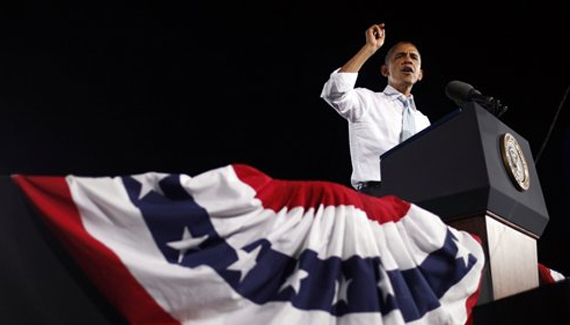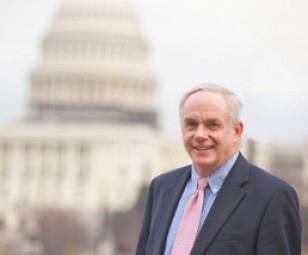
President Barack Obama speaks at a campaign rally in Las Vegas Sept. 30, before going into intense preparation for this week’s presidential debate against Republican Mitt Romney. Photo: AP
Romney’s Last Chance?
Less than five weeks to go before the election and now the presidential debates are front and center. There will be lots of pressure on Mitt Romney to do something during the debates — especially the first one Wednesday — to somehow change the dynamic of this race, which now favors President Barack Obama. The question is what will it be? And will it help or backfire?
Historically, debates are seen as major moments in the presidential election cycle. They go back to 1960 and the showdown between Democrat John Kennedy and the Republican candidate, Vice President Richard Nixon. Nixon’s refusal to wear makeup did not hurt him with those listening on the radio. They gave him the edge. But Kennedy had the advantage with TV viewers and the rest, as they say, is history.
A Little Debate History

Richard Nixon dabs at his face with a handkerchief while debating presidential rival John Kennedy in October, 1960. Some political scholars say Nixon’s television appearance in the debates helped seal his defeat. Photo: AP
In fact, largely because of Nixon, there were no debates between 1960 and 1976. Lyndon Johnson felt no need to give Barry Goldwater an equal share of the national stage in 1964, and Nixon was the Republican candidate in both 1968 and 1972, ergo no debates, thank you very much. Jimmy Carter probably benefited from being on the same stage with President Gerald Ford in 1976, though Ford’s blunder about “no Soviet domination of Eastern Europe” is one of the classic debate bloopers of all time.
Some political analysts say that the only debates that caused noticeable shifts in public opinion that affected the outcome of the election came in 1960 and 2000. That may be technically true, but I think you can also make a case for the 1980 debate between President Jimmy Carter and Republican Ronald Reagan. Reagan came into that debate with some voters still wary that he was a war-mongering right-winger. When he came across in the debate as genial and generally non-threatening, it really helped him dethrone Carter because so many people were looking for an excuse to vote against the incumbent president given the poor economy and the anger and frustration associated with the Iran hostage crisis.
In more recent years, some of the more memorable debate moments came in non-verbal form: President George H.W. Bush looking at his watch in 1992 while Bill Clinton and Ross Perot held the floor. Al Gore’s weird sighing habit in 2000, which was apparently supposed to show exasperation with his opponent, Texas Governor George W. Bush. Perhaps strangest of all was Gore walking up to Bush as he spoke during one of the debates, bringing a quizzical response from the Texas governor. It made Mr. Bush seem normal and Mr. Gore, well, less so.
Debate Stakes

Republican presidential challenger Mitt Romney rallies his supporters at a campaign event in Denver, Colorado, Oct. 1.
Mr. Romney would dearly love to change the trajectory of this race, which right now is headed in the president’s direction. But how? Be more aggressive? That carries enormous risks.
In the Republican Party primary elections, Mr. Romney was consistently the best debater of the bunch. He could be effective on the attack. But he could also come off at times as a little snooty and arrogant, like the time he challenged Texas Governor Rick Perry to a $10,000 bet. Yeah, Mitt, everybody’s got a spare $10,000 in cash lying around the house. Whatcha want to bet on?
And President Obama can, at times, come across as a bit aloof and professorial. If Mr. Romney can find a way to deflate him a bit in those moments, he might be able to score points with voters.
The problem for the Romney campaign is that he’s behind in some many key states with so little time left. He has to have something dramatic happen to really change the momentum of the race.
In fact, even some die-hard conservatives are clearly watching the polls and getting a bit disillusioned. One woman I interviewed last week out in Virginia’s Shenandoah Valley, a bastion of conservative thought, already has a plan in case Mr. Obama wins a second term. Her solution? Impeach him, based, she says, on several federal laws he has already supposedly broken.
All she has to do now is convince Republican congressional leaders. Of course, they have other problems at the moment — like holding onto their majority in the House of Representatives and trying to win the majority away from Democrats in the Senate. Impeachment may have to wait.
Heading into the debate both parties have a major fear. The fear for Democrats is that their supporters won’t show up in sufficient numbers on election day, allowing Mr. Romney to win a low-turnout election. The fear for Republicans is that Mr. Romney has already lost the election and that his lackluster convention, coupled with his gaffe about writing off 47 percent of Americans as dependent on government, have sealed his fate. The debates, especially the first one, may be Mr. Romney’s last and best hope for a game-changing moment in this year’s campaign.


4 responses to “Debate Duel out West”
[…] debateNational PostPresidential debate preparations continue – US politics liveThe Guardian (blog)Debate Duel out WestVoice of America (blog)Telegraph.co.uk -Washington Post (blog) -ABC Newsall 9,649 news […]
[…] (blog)Republicans pile on Romney ahead of first debateNational PostWashington Post (blog) -Voice of America (blog) -Telegraph.co.ukall 9,647 news […]
[…] debates Republican challenger Mitt Romney Wednesday …New York Daily NewsPlain Dealer -Voice of America (blog)all 13,666 news […]
[…] blog of the Voice of America, the U.S. government’s voice abroad: ” Nixon’s refusal to […]